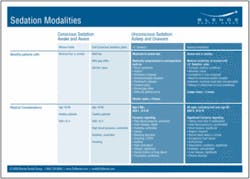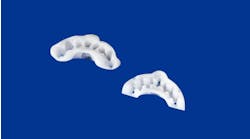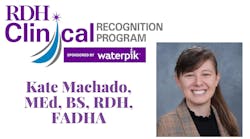A hygienist's experience with compassionate sleep dentistry
I am a very lucky person. Unlike a lot of people, I love my job. When I was in dental hygiene school, I knew I had chosen the right career path. I can't explain just why, but I was captivated and motivated by the profession from the start. We were taught by our instructors how to be thorough clinicians and educators, but I have found that the roles of the dental hygienist are many, and it is the combination of them all that is so fulfilling. Hygienists also have the opportunity to be periodontal therapist, counselor, friend, healer, soother, and a partner in total health care to name a few. It is so satisfying to be able to affect someone's life in ways you never knew you would.
I recently had the privilege of joining an exceptional dental team whose enthusiasm and dedication to their work is a constant source of inspiration to me. Working as a member of this team, I have gained great insight into many other facets of the dental and hygiene professions. Indeed, my experience with this firm's collective approach to elite patient care has helped me grow. I am inspired by the heartwarming interactions I have with our diverse client base.
All of us, in the course of practice as hygienists, have been faced with great challenges, such as trying to treat patients who are afraid of dental work, treating patients with severe gag reflexes, or serving clients whose disabilities make application of care at the level deserved and needed immensely difficult. Despite the training received in hygiene school, we may still find ourselves inexperienced with the treatment of special needs clients. We might find it difficult to find others with the knowledge and experience to advise such treatment. Well, meet a dental team that specializes in just that — The Blende Dental Group.
The Blende Dental Group (www.drblende.com) is a private dental practice located in San Francisco, dedicated to serving the dental phobic, disabled, geriatric, and medically compromised communities. We serve individuals suffering from conditions such as Alzheimer's disease, autism spectrum disorder, Parkinson's disease, rampant caries due to xerostomia, and mental disability — these underserved populations are the core of our practice. The practice's unique approach is to provide definitive full-mouth rehabilitation under general anesthesia and I.V. sedation, taking all cases to completion.
An Underserved Community
Many dentists offer some sedation options, such as oral medications and/or nitrous oxide, to reduce fear. While these methods work well for many patients, they are often not sufficient for patients who are not physically or behaviorally able to cooperate with dentistry. In addition, patients who are medically compromised could be placed at risk if they are not treated in a facility with the appropriate equipment or the experience to deal with potential medical complications. For these patients, I.V. sedation or general anesthesia is the safer sedation modality. We work with each patient individually to determine the most appropriate sedation approach.
The need for special-needs dentistry is great. According to 2003 U.S. Census data, more than 34 million adults and 5 million children in this country (12% of the population) suffer from a mental or physical disability. In addition, another 15% of the population are so profoundly afraid of dental procedures that they avoid care as a result. Therefore, it is clear that a fourth of all Americans could benefit from a special-care dental practice.
For more than 20 years, Dr. David Blende has focused his practice on this underserved population. As the majority of the practice's patients come as referrals from family dentists or other health-care providers, Dr. Blende works closely with the referring dentists/physicians to administer the most appropriate care for the patient. The practice has recently treated people from more than 16 countries and 24 states, regularly performing extensive and complicated dental work for traveling patients who can make only one trip to San Francisco for treatment. Indeed, we have served patients who have had as many as 28 crowns prepped and seated in as few as four days!
Dr. Blende began his career treating poor and malnourished children in inner city Los Angeles.
"Because pediatric anesthesiology was limited at that time, and children are higher-risk patients," he explains, "the rule in the hospital was that you could only use general anesthesia on a patient for an hour."
Following those experiences, Dr. Blende discovered he has the knack for speed and precision, which is required in special cases. Unlike dental offices in which the dentist administers the I.V. sedation, requiring him or her to both monitor the anesthesia and perform the dental procedure, the Blende Dental Group uses an experienced anesthesiologist to administer sedation. Our team enjoys privileges at several Bay Area hospitals, including California Pacific Medical Center and Kaiser Permanente, where Dr. Blende is the chief of the dental division.
Caring For Phobic Patients
One in seven people suffers from a fear of dentists so pervasive that it prevents them from obtaining regular dental care. The dental phobic individuals:
- Cannot be soothed or coaxed into receiving care
- Go to a dentist only as a last resort
- Make multiple appointments but rarely keep them
- Are not well treated with nitrous oxide or oral medications
- Unconsciously mask their fear by exhibiting anger toward the dental team
- Are incapable of being treated to completion
Individuals such as these frequently have extensive dental disease, are often missing teeth, and are at greater risk for overall health problems. They often avoid smiling and laughing for fear of negative judgment by others.
The result of avoiding preventive maintenance for years at a time is that these phobic patients require multiple, lengthy appointments and consultations with specialists. Due to the nature of these phobias, patients often emerge from a long course of treatment with worsened fears, thereby compounding the frustration of the staff whose job it is to assist them. Because of this cycle of avoiding treatment, most phobic patients have a depleted reservoir of courage and, therefore, cannot endure lengthy treatments successfully without the use of sedation. Indeed, without I.V. sedation or general anesthesia, most phobic patients quickly lose courage at the start of their treatment and often stop going to their appointments altogether. Their treatment left incomplete, these individuals face further deterioration of dental health if there is no alternative venue for treatment.
Patients who receive I.V. sedation or general anesthesia are able to sleep through the entire dental treatment. The Blende Dental Group condenses extensive treatments into one or two comprehensive visits so that patients don't have to keep "getting up their nerve" for multiple appointments. In order to accomplish this, specialists are brought in to do work simultaneously, and the patient benefits from one appointment rather than several. Treatment is completed in a predictable way, with an elegant result. In many cases, phobic patients return to their general dentists for their relatively noninvasive routine care, which can be accomplished without the fear of pain or embarrassment that has always haunted them.
Dr. Blende says, "One of our rules is not to let the patient's overlying medical condition dictate the treatment plan. We see the person first, and design the elegance of the treatment to match that individual. Then we look at the disability or phobia and set about the task of defeating its limitations."
A very typical patient, Christy*, is extremely phobic and has always found it difficult to simply walk through the door of a dental office. Christy elected to have all of her treatment (crowns, bridges, root canal treatment, and periodontal scaling and root planing) performed while asleep and pain-free, utilizing I.V. sedation. A few months later, Christy was scheduled for a periodontal maintenance appointment with me. We weren't sure what to expect for this first "awake" visit and, as it turned out, Christy showed up 45 minutes late to the appointment — in tears. She understood that she could not be seen for treatment in the few minutes left of her appointment, but knowing that she had all her possibly "painful" treatment already completed under I.V., she wanted to try again. Before she left that day, I introduced myself and, together with a patient care coordinator with whom Christy already felt comfortable, we talked about her needs. I reassured her by telling her that we would never do anything to her that she was uncomfortable with, that she could set the terms of the interaction. Realizing this, Christy came back and allowed me to proceed with the appointment and made it all the way through! Since that day, Christy's improvement has been phenomenal! She is motivated and proud of her accomplishment of successfully completing her dental care program.
Blende Dental Group introduced me to a whole new kind of patient service — caring for an underserved population previously unable to receive dental care without the benefits of sedation dentistry. People come to our practice from all over the country, indeed the world, and leave the appointment with a successful outcome, perhaps for the first time in their lives. Patients return home with a new mouth and a brand new feeling about themselves. The rewards are many. As a hygienist, I get to treat patients, make a connection, and sometimes help them break through the fear that was holding them back. To have someone allow you to touch him or her for the first time, perhaps ever, is touching indeed.
* name has been changed at the request of the patient
About the Author
Lorna Smith, RDH, graduated in 1996 from the dental hygiene program at Forest Park in St. Louis, Mo. She has been practicing in San Francisco for more than 10 years. You can reach her at [email protected].








